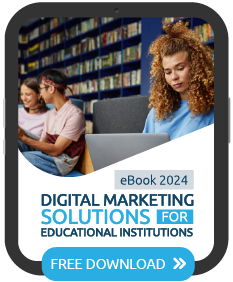Despite being popular for years, blogs continue to dominate as a powerful method of attracting and engaging prospective students. By choosing the right blog topics for education, your school can create content that captivates prospects and encourages them to explore what more your school has to offer.
Research shows that companies who use blogs as part of their marketing initiatives produce an average of 67% more leads each month. For schools, this approach can be a way to increase brand loyalty as well as lead generation—creating content that resonates with prospects and enables them to develop a more positive impression.
In addition to avoiding common content marketing mistakes, you’ll want to create engaging blog post topics that draw your readers in. Here are some key steps and creative content ideas to help your school get the best out of its blog and entice its audience to keep reading!
Understand Your Target Audience and Define Your Goals
Different schools typically have different audiences, targeting prospective students or even parents of prospective students. In some cases, your content may be tailored to a mature student, an international audience, or even a family. For this reason, understanding your audience and paying attention to key demographics are key steps to take when developing your blog topics for education.
More specifically, you’ll want to refer to your target personas, semi-fictional profiles of your target audience. These profiles generally include important background information, as well as motivations, concerns and key messages.
Example: The image below describes the key background information as well as the motivating factors for enrollment and relevant concerns regarding The International Student persona:
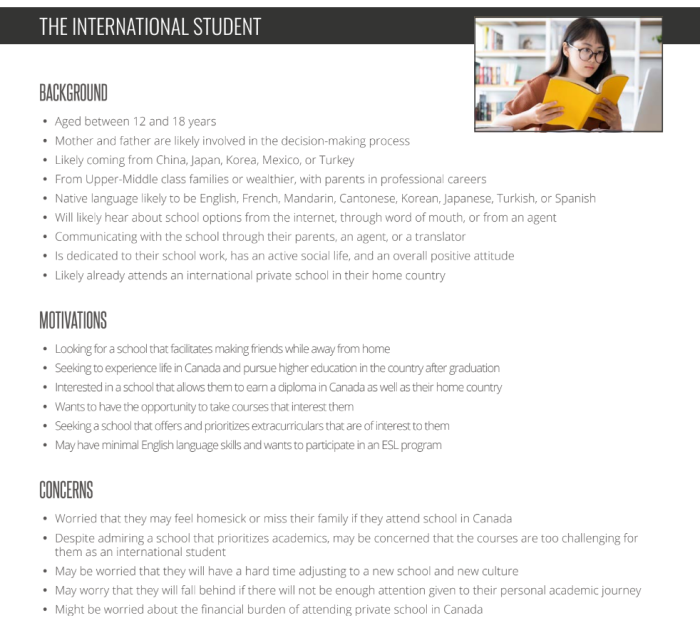
Taking this step ensures that your school can integrate valuable messaging in its future content development efforts. These key messages can even help you create personalized content and identify important topics to cover, giving you the chance to create something that would resonate and leave a lasting impression.
Just as it is important to understand your audience, it is essential that you define your goal when creating new blog content. As you brainstorm blog topic ideas, you’ll want to be sure that your efforts align with your ultimate goals—whether that’s nurturing leads or generating conversions. This way, you’ll be able to include an impactful call-to-action (CTA) in your blog post.
Conduct Keyword Research to Identify Popular Topics for Your School
To get the most out of your blogging efforts, you’ll want to use keywords more regularly. But first, you’ll need to make sure that you’ll integrate the right ones into your blog post topics. This is where keyword research comes into play, providing you with the insights you need to maximize your SEO impact.
When conducting keyword research, you can rely on a range of online tools to discover relevant keywords with a high monthly search volume and a higher likelihood of ranking for them. Here, you’ll want to aim for “long-tail keywords” that your audience regularly searches for. These longer keywords often contain a topic for your school to explore. For instance, the long-tail keyword “benefits of engineering school” can be an opportunity for a school with an engineering program to create content about what prospects can gain.
Embracing this approach can even help you create engaging, relevant evergreen content and blog topics for education, which would stand the test of time. This type of content is SEO-rich, providing your prospects with continuous value while also contributing to better SEO rankings on search engine results pages.
Create a Content Calendar when Exploring Blog Topics for Education
A successful blog relies on consistency, and an effective content calendar can help create a consistent production schedule. By creating a content calendar, you can better organize your blog post topics and focus on meeting your content marketing goals.
You can also use your content calendar to maintain a consistent posting schedule—helping your school release relevant content on a regular basis to continue enticing your prospects. If you’re aiming to enhance your content marketing approach, then our team can help you improve your inbound marketing strategy and content calendar development efforts.
Generate Content for Prospects in Different Stages of the Enrollment Journey
A good practice when developing blog topics for your school is to brainstorm ideas for prospects in different stages of the enrollment funnel. Prospects who have just discovered your school or are in the process of considering their options will likely gravitate towards different blog topics compared to those who are ready to convert or who have already converted.
In the early stages, aim to create topics that introduce your school—making it easier for readers to identify the target audience and connect with what’s being written. This stage, focused on attracting and engaging your prospects, can be an opportunity for your school to highlight insights from its faculty and team that would capture your audience’s attention.
For example, Summer Institute for the Gifted has created a blog post that outlines what its online programs can offer its students. This content is designed to showcase the value of the school’s program, emphasizing the benefits that students can expect.
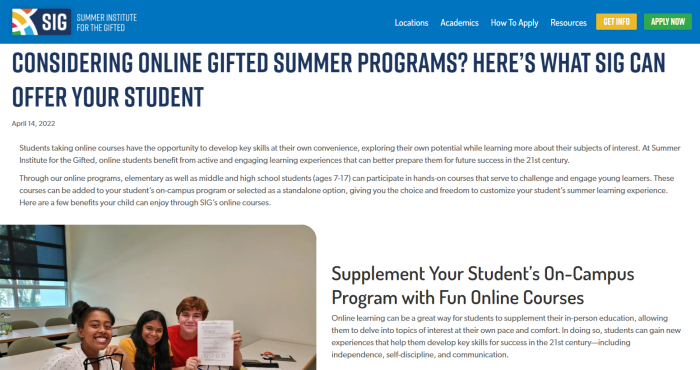
Source: Summer Institute for the Gifted
To target prospects in the middle of their enrollment journey, you’ll want to develop blog content that nurtures and motivates. Because your audience will have already been familiar with your school and its programs, you’ll need to create content that goes beyond the basics. This is where you can delve deeper into specific aspects that make your school unique—choosing blog topics for education around your school’s approach, facilities, specific programs, etc.
Here, Summer Institute for the Gifted takes on a slightly different angle by focusing on the value of their “hands-on” learning approach:
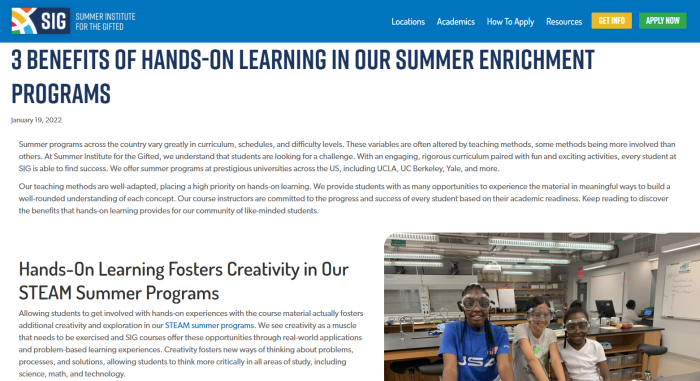
Source: Summer Institute for the Gifted
When it comes to retaining prospects, you may opt for blog topics that incorporate similar approaches to what was previously explored. That’s largely because there’s a lot that can overlap, especially since you’ll want to continue emphasizing reasons why your school is the best choice. You can use this space to choose blog topics that boost your school’s credibility. For instance, you can create blog posts that build on your school’s reputation or ones that showcase the value of the investment that parents or students have made.
Blogs that highlight community members, particularly students, can be an effective and engaging way to accomplish this goal. The University of South Florida’s College of Education creates blog content that can also be used to target prospects in this stage of their journey. The content here illustrates how a current student is achieving her career goals at the school, motivating students to continue their studies while also inspiring new ones to join and gain similar benefits.
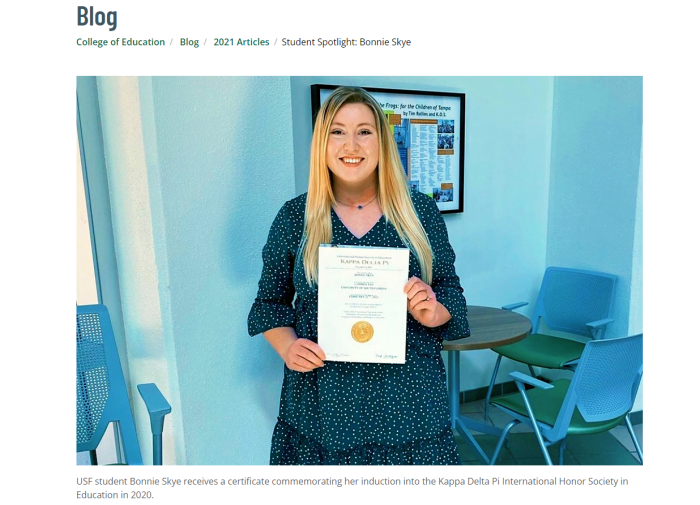
Source: University of South Florida
Address Your Prospect’s Motivations and Concerns with Blog Topics for Education
When you understand your audience, you can create content that has a strong impact. A reliable way to develop blog topics for education is to refer to your student personas and study their motivations and concerns. With those in mind, you can create articles that effectively address these points, making it harder for prospects to resist converting.
Example: Financial support can be a common concern for many students attending college or university. To address this, Webster Vienna Private University has created a dedicated blog that focuses on the various scholarships on offer.

Source: Webster Vienna Private University
Stepping into your persona’s shoes and trying to understand their concerns and motivations can help you effectively identify whatever needs to be addressed. To connect with its high school audience and address potential concerns regarding how to maximize the learning experience, Summer Discovery created persona-specific content that informs readers how to prepare for the programs:

Source: Summer Discovery
Select Blog Topics that Showcase Your Vibrant Community
Student ambassadors can be a great help when expanding your content marketing efforts. They can even contribute to writing blog posts on your school’s blog, allowing you to give your community a voice—increasing your chances of attracting new traffic. This can also be an approach to show off your vibrant and diverse community.
John Cabot University takes this approach in the blog post shown below, written by a student who shares her experience during the first week of her study abroad program:
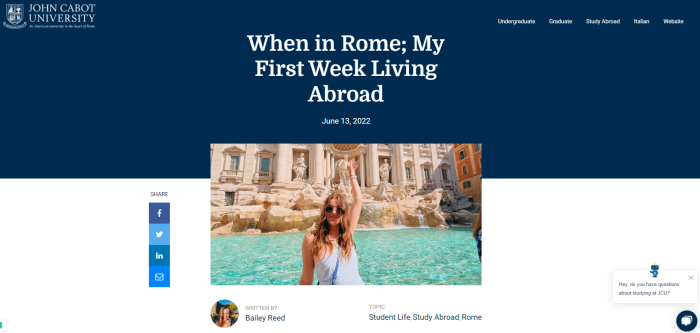
Source: John Cabot University
If your school hosts regular events or has a new initiative coming up, you can take this opportunity to create content around that topic. John Cabot University keeps its blog diverse by integrating different types of blog topics for education. In this particular case, JCU shares key insights about its Creative Writing Institute, which is running this summer. Notably, the blog also features direct quotes from faculty and alumni.
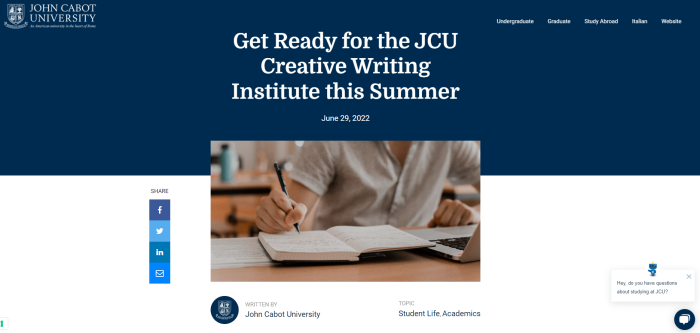
Source: John Cabot University
Highlight Your School’s Expertise through Specialized Deep Dives
Schools with multiple departments and faculty members have the chance to showcase their academic excellence and expertise in various subjects. When brainstorming different blog post topics, you can consider inviting your faculty to demonstrate their expertise or share their research. This step allows prospects to become more familiar with their potential professors while also letting the hard work of your community shine.
Example: WU Executive Academy has released a case study written by an experienced faculty member on its site. This approach naturally attracts prospects interested in exploring the subject at hand, highlighting the author’s experience in the field in a way that creates a stronger impact.

Source: WU Executive Academy
Share Student Testimonials and Alumni Success Stories in Your Blog Content
Student testimonials and success stories often serve as social proof when shared with your target audience. As you explore blog topics for higher education, consider sharing student feedback and experiences to inspire and encourage prospects to convert.
The example below shows how an alumna from Boston University took advantage of the school’s resources to earn a scholarship from the US State Department:
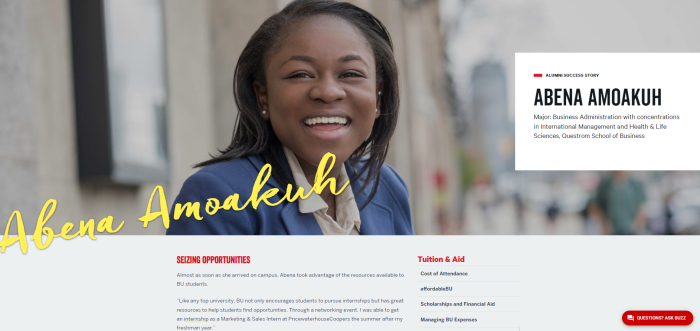
Source: Boston University
Stories like these enable you to showcase student achievements, allowing prospects to read about the value of your school’s education through a compelling narrative—one that they can resonate more closely with.
Monitor Your Analytics to See What’s Working and What Isn’t
An effective blog delivers long-term value to your school, allowing you to maximize your student recruitment efforts and continuously draw in new prospects. However, to gain the most benefit, it’s important to regularly check your data analytics and monitor your performance. This way, you can see which blog topics for education are doing well and which aren’t. With this information, you can optimize your content marketing strategy and focus more of your resources on what works well.
You can also consider conducting a content marketing audit to identify possible issues with your overall process, taking a closer look at your existing assets while probing for any potential gaps in your strategy. By being proactive and diving straight into your data, you can ensure that your content development efforts are at peak performance, generating a high return on investment.



